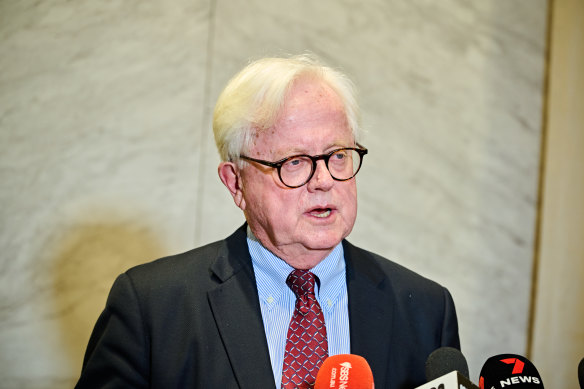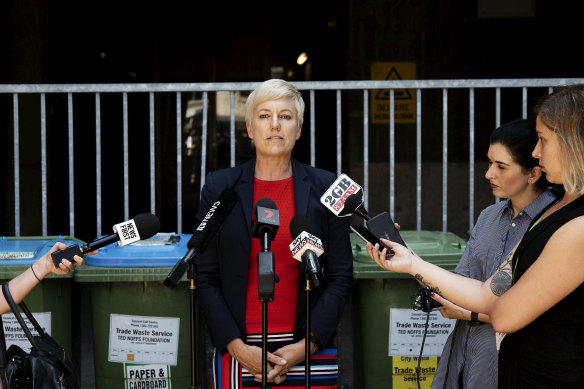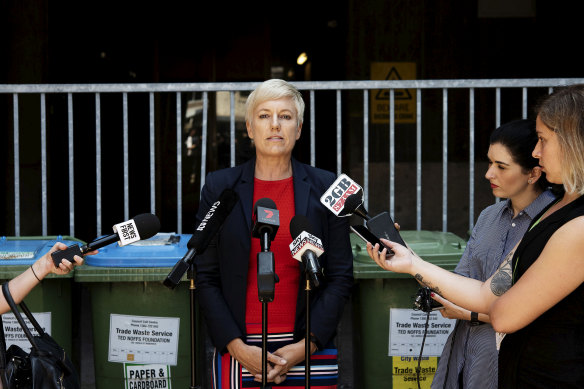The words of the liquor and gaming regulator fell like the first fat raindrops of a summer storm.
“Poker machines get targeted by criminal elements because they are a simple and effective way of money laundering, by washing cash through a machine,” Philip Crawford, then chairman of the Independent Liquor and Gaming Authority, said in November 2020.
“Any reasonable steps that can be taken to reduce money laundering in NSW, including use of technology, should be seriously considered by the government and by industry.”

Phil Crawford, ILGA chair and chief commissioner of the NSW Independent Casino Commission.Credit:SMH
A week earlier, the Bergin inquiry into the suitability of Crown Resorts to hold a casino licence in Sydney had completed its hearings, which uncovered extensive links between the casino operator and organised crime and staff facilitating money laundering.
Crawford believed that if criminals were washing their cash through the poker machines in casinos, they were sure to be doing so in pubs and clubs dotted across the state. And if the casinos were forced to tighten up their money-laundering controls, neighbourhood pokies would become open slather for dirty cash.
It was not an entirely new concept. Six months earlier, ClubsNSW had commenced litigation against its former compliance officer Troy Stolz for leaking board minutes that suggested up to 95 per cent of clubs were not compliant with anti-money laundering laws. (The Crime Commission found this figure was likely to have been “significantly overestimated”.)
But Crawford’s warnings were the beginning of a rush of authorities raising concerns about money laundering in pubs and clubs, which climaxed this week with the release of a joint law enforcement agency report led by the NSW Crime Commission. It found billions of dollars being put through the pokies each year were the proceeds of organised crime. It even recommended a solution: a mandatory cashless card.
With an election five months away, the momentum for such a measure has never been greater.
The independent Bergin and Finkelstein inquiries into Crown casino and the recent Bell inquiry into Star have all explored the benefits of cashless technology to combat gambling harm and money laundering. Anti-gambling advocates say the advice of three powerful public interest inquiries should hasten the need for NSW to respond and enact a cashless solution.
The Independent state MP for Sydney, Alex Greenwich, is now leading a push to wedge the Coalition and Labor on the issue, amending a registered clubs bill that is before parliament to make cashless cards mandatory in clubs. Crawford commends the crossbencher’s intent, but believes the solution cannot be rushed: “I just don’t think the tech is ready. It will be another couple of years.”
But cashless gaming has a powerful enemy in ClubsNSW, whose extraordinary political and financial influence could yet ensure it fails to see the light of day. As the peak body for at least 6.7 million members at more than 1000 clubs across the state, ClubsNSW’s reach is extensive, never more so than in the lead-up to an election. Some of its clubs derive more than 80 per cent of their revenue from poker machine profits. It argues it would cost more than $800 million to change the machines to accommodate the card, costing thousands of jobs.
ClubsNSW has seized on the findings of the report to support its own narrative, which has long maintained that criminals were not using poker machines to clean the proceeds of crime.
“The NSW Crime Commission found that using gaming machines to clean large quantities of dirty
money is ‘high risk and inefficient’ and that the practice is not widespread,” ClubsNSW chief executive Josh Landis said on Wednesday. “This report vindicates clubs and their 53,000-plus employees across the state. It confirms clubs do not aid or abet money laundering.”
The Crime Commission did find that organised criminals were putting the proceeds of crime through poker machines – billions of dollars of it. But it did not find the pokies were being used to clean large amounts of dirty cash on a grand scale, though that was happening to some extent. The criminals pumping their money through the poker machines were, for the most part, like any other gamblers: playing their money and losing it.
Crawford scoffs at ClubsNSW’s claimed vindication and “wholesale denial” of the pox on its house. “It’s really disappointing. It doesn’t matter if it’s money laundering or just spending proceeds of crime. It’s all illegal,” he tells the Herald. He adds that clubs risk losing credibility over the issue. “To have these poker machines is a privilege, not a right. In part, they need to be the author of the remedy here.”
NSW Crime Commissioner Michael Barnes says: “Good criminals pay professional money facilitators to have their money laundered. Cryptocurrency … it’s in Turkey in three minutes. They’re the sort of people who know what they’re doing.
“These mid-level drug dealers don’t have access to that. They’ve got thousands of dollars in cash, and they don’t know where to put it.”
Independent MP Justin Field says this shows there are deep connections between gambling and organised crime and discredits the common assertion by pubs and clubs that they would not aid money laundering because they had nothing to gain from cash in-cash out play.
“What this report shows is that it’s actually organised crime money that’s being gambled, and the venues are the beneficiaries,” Field says. “It blows apart for the first time the extent to which gambling harm is a driver of criminal activities.”
“These mid-level drug dealers … (have) thousands of dollars in cash, and they don’t know where to put it.”
NSW Crime Commissioner Michael Barnes
NSW accounts for some of the highest poker machine losses of anywhere in the world, with average losses per player of more than $4500. Nationally, the figure is $2800. Over the past three decades the state’s punters have lost $135 billion to poker machines, twice that of Victorians.
Premier Dominic Perrottet insisted this week that he would not allow criminal activity to continue occurring in pubs and clubs under his watch. “It’s not happening. So I’ll work with industry to fix it, and we’re going to fix it,” Perrottet said.
Since Barry O’Farrell claimed government in 2011, the Coalition has agreed to successive memorandums of understanding with ClubsNSW every four years. The document locks in commitments not to increase gambling taxes and to maintain existing regulatory regimes. NSW Labor has made similar pre-election commitments.
A new MOU has not yet been signed by the government or NSW Labor. The head of gambling research at Monash University, Charles Livingstone, says the findings of the inquiry will make an MOU difficult for both sides of politics.
“Doing so is not far from Gotham City mayor signing a deal with the mob,” he says.
“How can an MOU now exist? We have an independent commission that is supposed to be fighting organised crime, releasing a report before an election saying these guys [pubs and clubs] are effectively facilitating the proceeds of crime.”
NSW Greens MP Cate Faehrmann says MOU agreements “tie the hands” of governments by preventing them from enacting serious poker machine reform.
“I think the question is: is the Crime Commission report stronger in the eyes of Perrottet and Chris Minns than the potential threat of a massive campaign by ClubsNSW at the election? Which are they more fearful of? To be honest, I worry it’s ClubsNSW and the Australian Hotels Association,” she says.

Greens MLC Cate Faehrmann has spoken out against a memorandum of understanding.Credit:Christopher Pearce
On Thursday, Minns said the findings of the inquiry were troubling, but he insisted he was unwilling to back in any recommendations, including for cashless gaming, until he had consulted law enforcement. He conceded that signing an agreement or memorandum with ClubsNSW could be “problematic”.
“We haven’t signed anything,” Minns said. “Obviously, we would talk to stakeholders across industries, whether it’s in the gaming sector, whether it’s clubs, whether it’s sporting associations.”
In NSW, pokies reform promises to be politically fraught. But conviction politicians need only look with envy to Tasmania, Australia’s smallest state, which became the first jurisdiction to legislate a cashless gaming card for use in hotels, clubs and casinos last month. The policy, which drew heavily on Dominello’s proposal for NSW, will enforce pre-set default limits of $100 a day, $500 a month and $5000 a year. It followed recommendations by the Tasmanian Liquor and Gaming Commission and will take effect by December 2024.
The Morning Edition newsletter is our guide to the day’s most important and interesting stories, analysis and insights. Sign up here.
